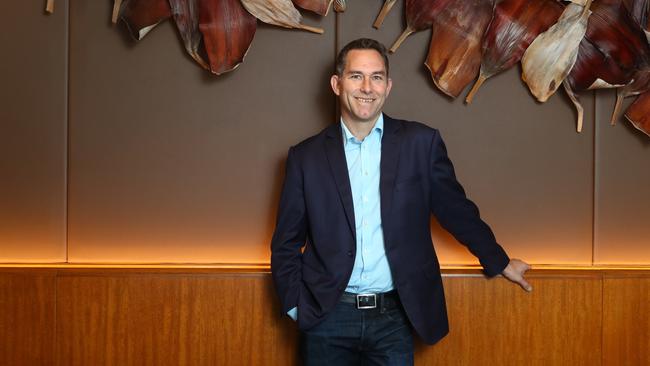Bendigo Bank bites bullet on new branches

Expecting the chairman to rhapsodise about his bank’s commitment to local communities, a shareholder was nonplussed when Johanson said there were no plans to raise the Bendigo flag above newly vacated big four branches.
“We look at business opportunities but we’re not going to swim against the tide when everyone’s using mobiles to access their banking,” he said.
Like banks the world over, Bendigo is struggling to keep up with the insatiable customer demand for all things digital.
As Australia’s banks shutter their branches at a rate of about 15 a month, it makes no strategic sense to double your bets on an expensive and outdated distribution channel when many customers are now doing their banking exclusively on mobile apps.
What’s more, they’re happier when they do it, even when the process is clunky and sometimes counterintuitive compared to shopping and music apps, or even ride-sharing.
A recent survey by Boston Consulting Group found retail banks ranked ninth in terms of customer willingness to advocate for the bank’s services. Ahead of the banks were the car industry, smartphones, cosmetics, pay-TV and video streaming, health insurance and retail grocery, with gas and electricity lagging at number 10. The digital-only operators scored highest among the banks.
So, just as omni-channel hit the retail industry years ago, the challenge for banks is to deliver a seamless, digital-first service across all channels and devices.
Customers can currently choose whether to go to a branch, speak to a call centre, or chat online. However, the interactions are rarely shared between channels.
The future is integration, with customers accessing information and advice through the most convenient channel.
“Banks will communicate using text, voice (human or automated, online or in person) and video. They will leverage artificial intelligence, automatically routing a customer to the most relevant option, identified on the basis of cost to serve, the complexity and nature of the customer’s request, and client preference,” BCG says.
Benefits will include faster service, higher conversion rates and increased customer satisfaction.
At the product end, banks are engaged in massive simplification exercises, with many of their products attracting little demand.
The endgame will be a mass-market, low-cost offering distributed digitally.
More affluent customer segments will be targeted with fewer, more complex products.
Data analytics combined with the willingness of Millennials to share their personal data in return for tailored banking solutions will also see “mass personalisation” of product offerings.
“Customers will get the experience, channel, products and pricing that corresponds to their needs. In high-value interactions humans will intervene at key moments,” BCG says.
“Tech giants and new entrants have raised the bar and banks must keep pace.”
While branches will not completely disappear, there will be no reversal in a declining trend.
CBA’s Yetton in limbo
When Commonwealth Bank scrapped its plan for a wealth spin-off last March, attention predictably turned to the future of Jason Yetton and his management team, which CBA had assembled in anticipation of a multi-billion-dollar public listing. Yetton, the former senior Westpac executive and ex-chief executive of marketplace lender SocietyOne, lost his chief financial officer Andrew Morgan to rival operator MLC Wealth in mid-September.
Since then, there’s been a lot of water-cooler discussion about Yetton’s next move.
The official line at CBA is Yetton isn’t going anywhere, at least for now.
“As CEO of NewCo, Jason is focusing on the significant work that is being done across all of those businesses to deliver the complex remediation programs which are a key part of our commitment to become a simpler, better bank for our customers,” a spokesman said.
For all its faults and justified reputation as ground zero for much of CBA’s misconduct, NewCo is not just a wealth customer remediation machine.
The spin-off was effectively killed with the $4.1bn sale of Colonial First State Global Asset Management in October 2018 to Mitsubishi UFJ, which halved the size of the demerger.
NewCo, however, still has Colonial First State — a superannuation and investment platform with more than $135bn in assets under management — and stakes in third-party distribution businesses, including Aussie Home Loans and Mortgage Choice.
The strategy remains for NewCo to exit CFS as well as the aligned advice brands Count Financial, Financial Wisdom and Commonwealth Financial Planning Pathways.
The sale of Count Financial to CountPlus was completed earlier this month, and CBA will proceed with an assisted closure of Financial Wisdom, which is likely to conclude around the middle of next year.
CFP-Pathways advisers have the choice of transitioning to self-licensing arrangements or moving to another licensee.
As for remediation, who knows when the curtain will be drawn, and the same applies to Yetton.
While speculation that he’s already got one foot out the door is wide of the mark, he’s unlikely to stay around to write remediation cheques.
Decision time is likely to be around the end of the year — or soon after.
gluyasr@theaustralian.com.au
Twitter: @Gluyasr



Time froze on Tuesday when retiring Bendigo and Adelaide Bank chairman Robert Johanson passed up a gilt-edged opportunity to rail against further branch closures by the hated big four banks.